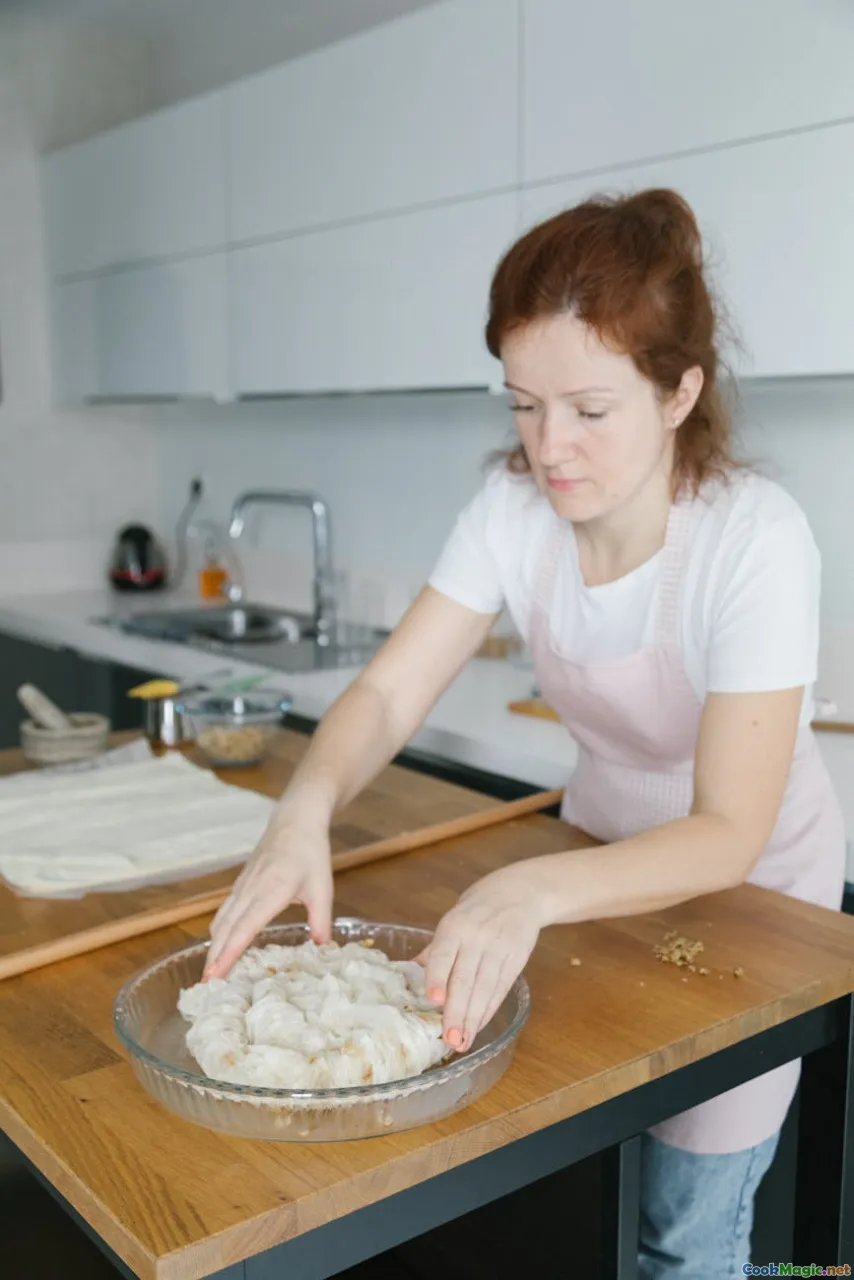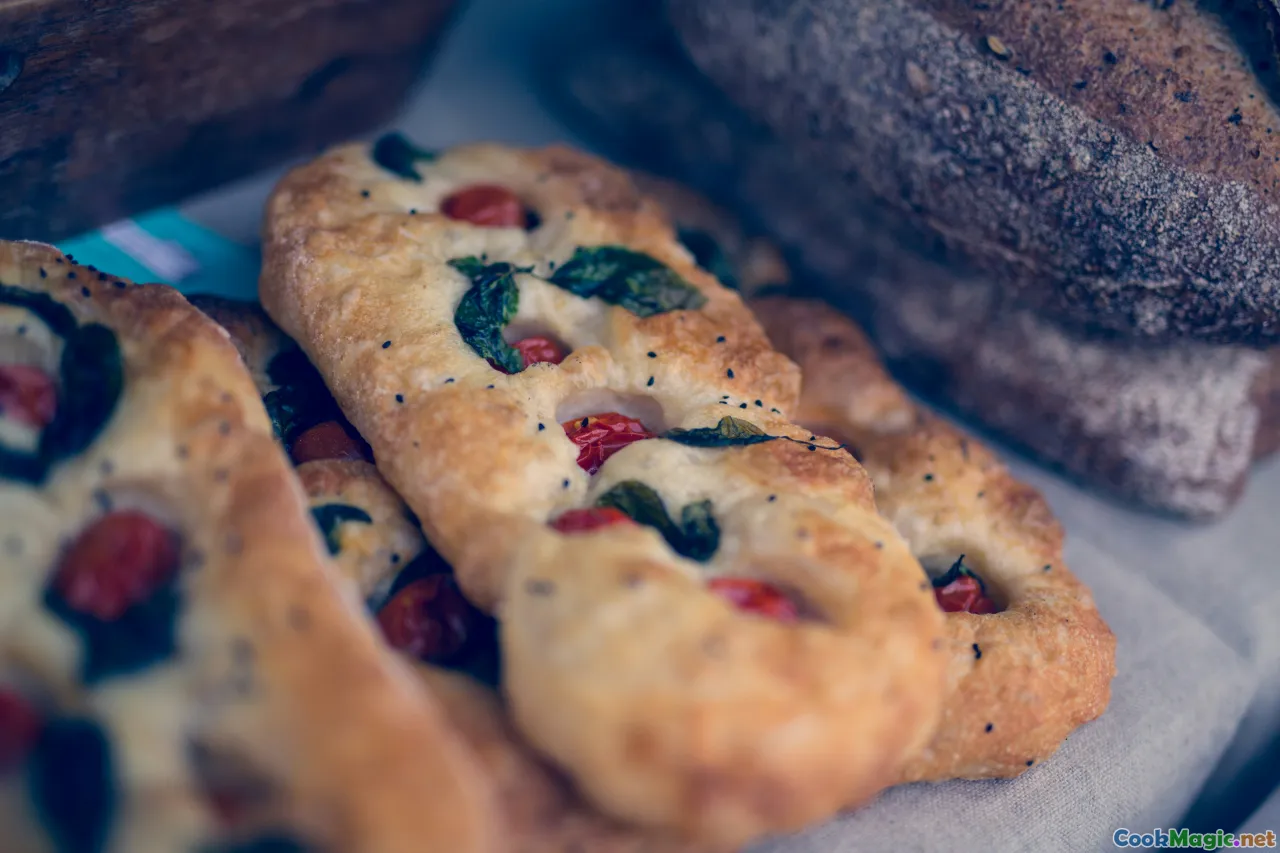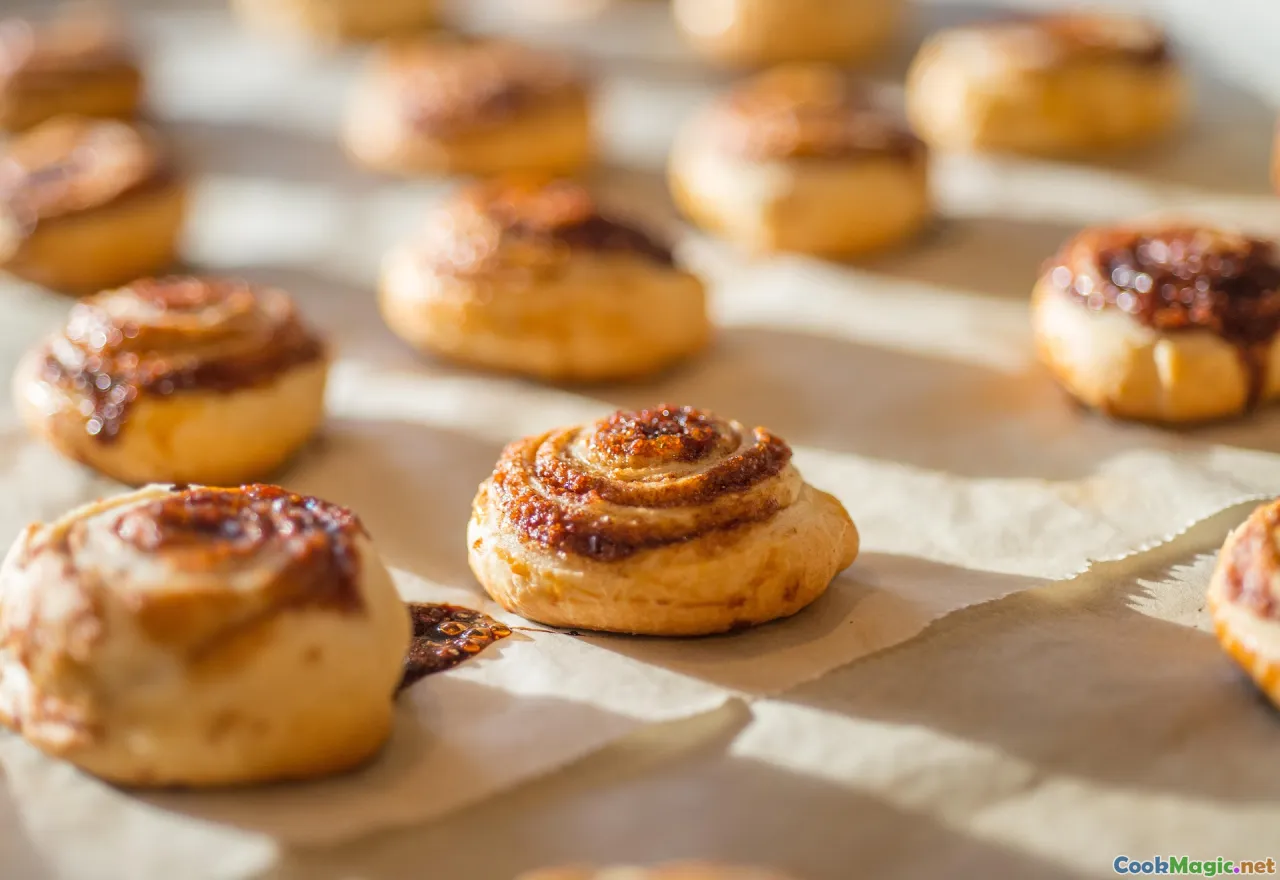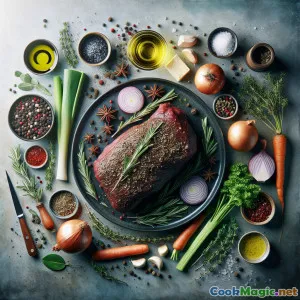
Bureek de Espinaca: Delicia de rollos crujientes de espinaca
(Bureek Sabanekh: Crispy Spinach Rolls Delight)
(0 Reseñas)0
997
agosto 01, 2025
Informar de un problema
Ingredientes
-
8 sheets Hojas de masa filo
(Descongelar si está congelado)
-
250 grams Espinaca bebé
(Lavado y picado groseramente)
-
100 grams Queso Feta
(Desmenuzado)
-
80 grams Queso Ricotta
(agrega cremosidad)
-
1 large Yema de Huevo
(For sealing pastry)
-
2 tbsp Aceite de oliva
(For sautéing and brushing pastry)
-
1 small Cebolla
(Cortado en pequeños cubos)
-
2 cloves Ajo
(Picado)
-
1/4 tsp Nuez moscada molida
(Agrega profundidad aromática)
-
1 tbsp Eneldo fresco
(Finely chopped, or substitute parsley)
-
1/2 tsp Sal
(Al gusto)
-
1/4 tsp Pimienta negra
(Recién triturado, al gusto)
-
2 tsp Semillas de sésamo
(Para decorar)
(Descongelar si está congelado)
(Lavado y picado groseramente)
(Desmenuzado)
(agrega cremosidad)
(For sealing pastry)
(For sautéing and brushing pastry)
(Cortado en pequeños cubos)
(Picado)
(Agrega profundidad aromática)
(Finely chopped, or substitute parsley)
(Al gusto)
(Recién triturado, al gusto)
(Para decorar)
Nutrición
- Porciones: 4
- Tamaño de porción: 2 rolls (approx. 125g)
- Calories: 315 kcal
- Carbohydrates: 0 g
- Protein: 10 g
- Fat: 18 g
- Fiber: 3 g
- Sugar: 2 g
- Sodium: 675 mg
- Cholesterol: 45 mg
- Calcium: 175 mg
- Iron: 3 mg
Instrucciones
-
1 - Prepare the Filling:
Heat 1 tbsp olive oil in a pan over medium heat. Sauté diced onion until translucent, about 3 minutes. Add garlic and cook another minute. Stir in chopped spinach and cook until wilted—about 2–3 minutes. Remove from heat, allow to cool for a few minutes.
-
2 - Mix Cheese and Herbs:
In a mixing bowl, combine the cooked spinach mixture, feta crumbles, ricotta cheese, nutmeg, dill (if using), salt, and pepper. Mix until well incorporated.
-
3 - Prepare Filo Sheets:
Unroll filo pastry and cover with a damp cloth to prevent drying. Place one sheet on a clean surface, lightly brush with olive oil, and top with a second sheet. Repeat to make 4 sets of double-layered sheets.
-
4 - Fill and Roll:
Scoop about 1/4 of the spinach filling onto the lower part of each double-layered filo set. Roll up gently, folding sides over to encase filling. Seal the edgy closures with a bit of beaten egg yolk.
-
5 - Brush and Top:
Place the rolls seam-side down on a lined baking tray. Brush tops generously with olive oil and sprinkle with sesame seeds, if desired.
-
6 - Bake until Golden:
Preheat oven to 190°C/375°F (fan 170°C). Bake rolls for 18–22 minutes, or until golden brown and crispy. Let rest 2 minutes before serving.
Heat 1 tbsp olive oil in a pan over medium heat. Sauté diced onion until translucent, about 3 minutes. Add garlic and cook another minute. Stir in chopped spinach and cook until wilted—about 2–3 minutes. Remove from heat, allow to cool for a few minutes.
In a mixing bowl, combine the cooked spinach mixture, feta crumbles, ricotta cheese, nutmeg, dill (if using), salt, and pepper. Mix until well incorporated.
Unroll filo pastry and cover with a damp cloth to prevent drying. Place one sheet on a clean surface, lightly brush with olive oil, and top with a second sheet. Repeat to make 4 sets of double-layered sheets.
Scoop about 1/4 of the spinach filling onto the lower part of each double-layered filo set. Roll up gently, folding sides over to encase filling. Seal the edgy closures with a bit of beaten egg yolk.
Place the rolls seam-side down on a lined baking tray. Brush tops generously with olive oil and sprinkle with sesame seeds, if desired.
Preheat oven to 190°C/375°F (fan 170°C). Bake rolls for 18–22 minutes, or until golden brown and crispy. Let rest 2 minutes before serving.
Más información sobre: Bureek de Espinaca: Delicia de rollos crujientes de espinaca
Bureek Sabanekh Rolls: Tastes of Home and Heritage
The 'Bureek Sabanekh Rolls' recipe is a celebration of shared culinary traditions, fusing the cravable crispiness of Middle Eastern borek with ingredients familiar to English kitchens. 'Sabanekh' means 'spinach' in Arabic, while 'bureek' and 'boreka' are terms echoing throughout the Levant and Balkans for pastries treasured at homes and stalls alike. Bureek Sabanekh Rolls pay homage to both the Middle Eastern reverence for greens in pastry, and Britain's underlying love affair with savoury hand-held bakes—think Cornish pasties or sausage rolls. Here, flaky filo encases a creamy, herby blend that invites any cook to the comforting borderland of cultures.
A Bit of History
Spinach pies have been cornerstones of Levantine kitchens for centuries, commonly seen as "fatayer sabanekh": yeast-raised pastries shaped in tri-folds, sharing Friday tables during Lent and gracing picnics by the Mediterranean. The use of delicate, super crisp light pastry in the form of filo came later, largely popularized by Ottoman and Balkan influences. Migration, trade, and British curiosity have bridged these flavor traditions. The inclusion of locally available ricotta adds an unmistakable creamy lightness to what could otherwise be a drier old-world filling. Each Bureek Sabanekh roll bottles the age-old warmth of communal eating: finger foods shared among family or friend, over steaming tea or crisp cider.
How to Make Them Crisp and Golden
The real magic in Bureek Sabanekh rolls lies both in technique and restraint. Unrolling and layering the delicate filo might seem intimidating at first, but working steadily and keeping the sheets covered with a damp cloth between assembling rolls will prevent tearing and drying.
Remember to not overfill each roll; heavy-handedness can lead to splitting or sogginess. Brushing each layer lightly, not saturating, ensures shattering thinness with every bite without excessive oil.
Let everyone have a go at the rolling process—the flexibility of filo means these are forgiving, and off-centre ones merely add character. Don't forget, refrigerating the filling for a short while makes rolling easier.
Alternative Fillings & Flavours
This recipe seamlessly welcomes adaptation. Try:
- Swapping spinach for chard or finely shredded cavolo nero for more depth.
- Adding caramelised leeks or sautéed mushrooms.
- Melting a little cheddar into the feta/ricotta blend for a sharp English accent.
- Substituting dill with parsley or mint, if preferred.
Make-Ahead & Storage
What makes Bureek Sabanekh ideal is their convenience. Assemble ahead and freeze raw rolls individually; bake directly from frozen, adding a few extra minutes to the usual baking time. Refrigerated leftovers re-crisp perfectly in a hot oven—for all-day snacking.
Cultural Significance & Serving Traditions
In Levantine cultures, spinach pies at any gathering signify celebration and togetherness. In the British context, pastry-enrobed savoury treats are pricklingly nostalgic—evoking parties, bridge club spreads, or picnic baskets. With Bureek Sabanekh, you’re blending holiday traditions: the hesitation between a light starter and satisfying main. Official tables might serve them with a minted yogurt dip, classic cucumber raita, or robust English chutney on the side.
Personal Chef’s Notes
Growing up between traditions, I found both comfort and excitement in making hand-held pies—each slightly different, each layer unique. What enchanted me was how filo gleamed in the oven and sang under the knife's cut. These Bureek Sabanekh Rolls are as easily downed warm or at room temperature: truly versatile for lunchboxes, party platters, or next to a soup bowl at supper.
Celebrate cultural crossroads in your kitchen tonight—two histories, one golden, shattering bite at a time.
























